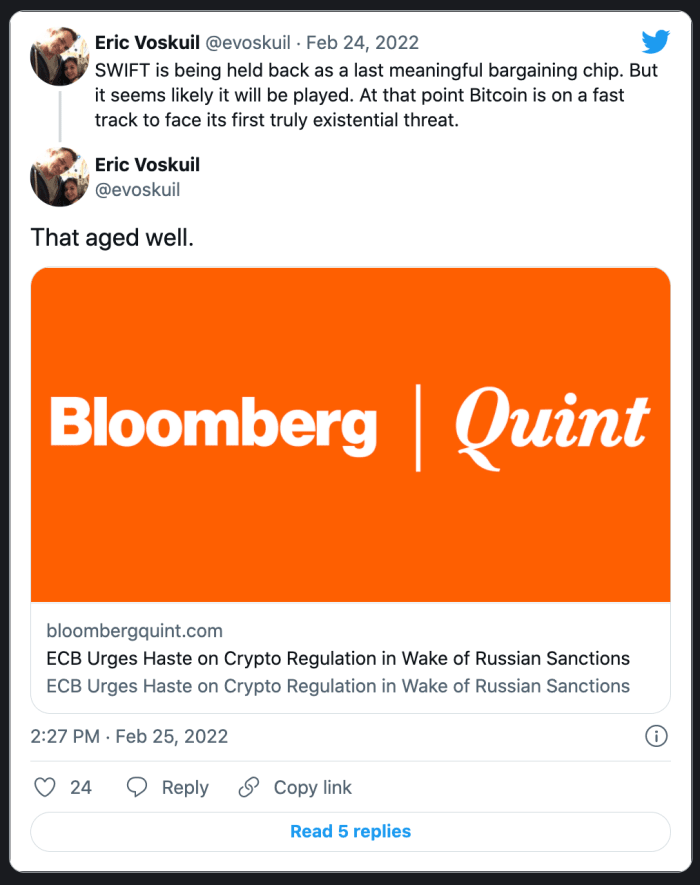The following is a direct excerpt from Marty’s Bent issue 1170: “This is what a real attack on Bitcoin would look like.”

(Source)
Here is something to pay attention to in the days, weeks and months ahead as the western world reacts to the Russian invasion of Ukraine. Will the Western world cut Russia off from SWIFT, the international messaging network used by banks around the world to settle transactions between themselves? If that happens, who will Russia turn to? And if they turn to bitcoin, how does the western world react from a regulatory standpoint?
To be honest, I don’t think the likelihood of Russia being cut off from SWIFT is as high as many claim. I could be wrong, but I think the level of dependence many European countries have on natural gas and other commodities flowing out of Russia will prevent those aligned against Russia from cutting the SWIFT deal on Putin and his crew.
That being said, let’s follow the path traced by Eric Voskuil above. Let’s say that Russia is excluded from the SWIFT network and is forced to look for alternatives. When it comes to anything but relative liquidity, the burgeoning bitcoin stack is a far superior money and payment system. There is a greater than zero chance that Russia will turn to bitcoin in this scenario. If they adopted bitcoin as an alternative to the USD and SWIFT system, the network would draw the ire of all anti-Russian governments and they would likely seek action to prevent bitcoin companies from interacting with Russia on the network. After all, the reason they would be kicked out of SWIFT is to prevent them from being able to transact alongside other network participants.
If Russians are able to get transactions included in blocks alongside individuals from countries that are still connected to SWIFT, that sort of cuts the cord. In an attempt to prevent this from happening, it is entirely possible that the US government and other NATO governments will attempt to impose regulations on the mining industry to maintain a blacklist of mining companies at all times. Russian bitcoin addresses and never mine a block with a transaction that is sent from one of these addresses for fear of being subject to severe penalties for violating the sanctions. Worse, they might even try to force a whitelist of approved addresses tied to individuals’ identities and ensure that mining pools are only allowed to interact with those addresses.
In a world filled with weak men driven by profit, it’s not hard to imagine that many corporate miners in the West would bend the knee to try and adapt to this so they could stay in business. . As Eric points out, this could be bitcoin’s first real existential crisis. It would make 2017’s fork wars look like a three-year-old football league. The fact that nation states are exerting this kind of pressure on corporations is a massive test.
Large network operations would be the easiest targets. Off-grid miners would require a bit more effort. And at home, minors would be the hardest to control. In this scenario, it is hoped that the hashrate is sufficiently distributed globally, with a significant percentage located in regions that do not plan to follow these regulatory attempts. On top of that, hopefully enough strong men will rise up to defend the network and what they know is fair and just. Bitcoin doesn’t actually work if this kind of censorship is allowed on the network. Bitcoin is imperative in the digital age if we are to prevent the Chinese Communist Party’s social credit system from being exported to the rest of the world. The insurance companies that make it what it is must be protected at all costs. Even if it means actively disobeying a corrupt and incompetent federal government.
And let me clarify, this is in no way an endorsement of Putin and what he is doing right now. It is an acknowledgment that bitcoin is so valuable to the world that bending the knee is not an option. Even if it’s to send a message to Russia. Instead of reacting hastily and in the fog of war, Western countries should give peace a chance and adopt a Bitcoin standard, which would level the economic playing field globally and create the conditions for a free trade such as humanity has never known. When free trade prospers, peace also tends to prosper.
Hoping for that is wishful thinking. If you’re in the bitcoin mining industry, it’s time to start taking this potential threat seriously. Start distributing your hashrate geographically as much as you can. If you’re a developer, make it extremely difficult to track transactions on the network, so the idea of that kind of regulation doesn’t even make sense in the first place.
Hold on to your ass, freaks.